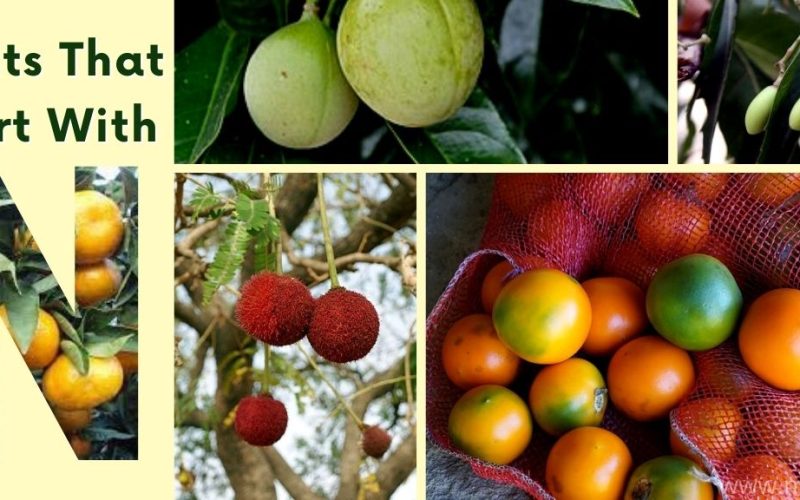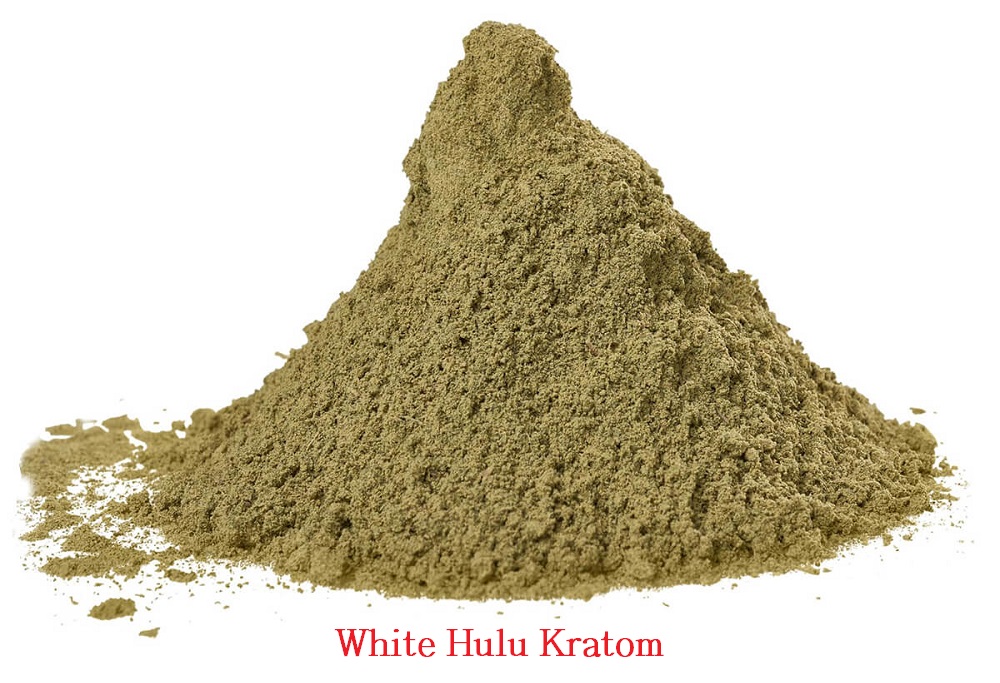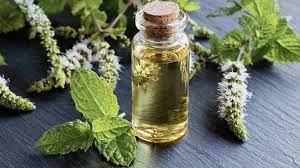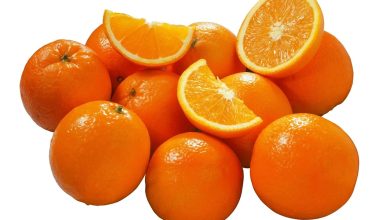Now that you’ve Googled “fruits that start with N,” we won’t ask you why since we believe we can assist you.
Here is a thorough list of fruits that start with N, perfect for anyone working on a school project or getting ready for trivia night.
Read on as we list out the fruits that starts with N.
40 Fruits That Start With N
Outlined below are the 40 fruits that start with N.
- Nance Fruit
The white pulp of Nance is rich in oil. It tastes sweet and cheese-like.
However, when it is fully ripe, it has a scent that crosses a sweet banana, with a little bit of lychee sourness and a hint of pear.
- Nonda Plum
Nonda Plum has an egg-like form. With dark brown markings, the fruit pod is yellow-brown. Outside, it has soft hair as well. The pulp is pliable and soft.
- Nectacot
As little as an apricot is a nectacot. The nectar looks quite similar to other fruits from the rose family, such as peaches, apricots, and nectarines.
Its yellow pulp has a pleasant flavor that will quench your thirst. Its skin is also silky.
- Nepali Hog Plum
The fresh Nepali hog plum is shaped like a little oval. When ripe, it is green and turns yellow. Even when fully mature, its flavor is very sour.
- Nectarines
Dull skin when you smell a nectarine, you’ll notice that it smells just like a regular peach.
In contrast to peaches, it has soft skin and is not fuzzy. It has a slightly sweeter flavor than peach.
- Nigella
As you might expect, Nigella is a type of dry fruit that has no meat. The flavor is mildly bitter and warm, with a faint herbal scent.
After being harvested and dried, a single Nigella fruit produces numerous tiny seeds that resemble black sesame.
- Noni
The noni fruit is around the size of a custard apple and has a rough appearance. It occasionally resembles a tuber rather than a fruit.
When the fruit is ripe, it will be golden with smooth skin instead of its youthful light green color.
- Nam Dok Mai Mango
When the mango is tricky green, you can still eat it. The most incredible flavor, though, is a fully ripe mango.
The flesh is smooth, creamy golden, intensely flavorful, and sweet when fully mature.
- Naranjilla Fruit
While Naranjilla tastes like a blend of sweet pineapple, juicy kiwi, and acidic lime, it smells like citrus fruits. People frequently add sugar to the light foam juice to lessen its sour flavor.
- Nannyberry
The Nannyberry is a tiny edible fruit, so you can savor its juicy and delicious flavor when it is ripe and turning red to midnight black.
- Nashi Pear
This pear almost resembles an apple in shape. It can grow to be pretty massive and smells pleasant.
The fruit’s interior is filled with a white, crunchy, and luscious pulp. The fruit loses its crunch as it turns a bright yellow.
- Newton Pippin Apple
The Newton Pippin apple is renowned for its powerful scent. Because it requires a hot summer and fall to be ripe and have the right flavor, its season doesn’t begin until October.
- Northern Spy Apple
The royal crimson skin of this particular apple variety, with light yellow and green striations on the fruit’s crown, sets it apart from other apple varieties.
You will initially find it a little sour, but the sweetness increases as you eat it more.
- Natal Plum
When ripe, natal fruit has a blended sweet and sour flavor. The plum’s taste is just as tart as cranberries.
- Nutmeg
To create juice, nutmeg rind can be pureed or cooked. It is famously used as a spice in oatmeal, curries, stews, soups, and sausages.
- Nagami Kumquat
The kumquat is shaped like a little oval. It has a mild, somewhat tart flavor. The peel appears a little bit peppery because of the essential oil.
- Navel Orange
The navel orange is oblong to slightly circular. Its appearance and peel resemble other varieties of orange in only minor ways.
This orange has low acidity and a sweet, fragrant flavor that is slightly tart and juicy.
- Nocera (Italian Grape)
The Nocera grape cluster is usually about the size of a pencil and shaped like a cylinder. It has many oval berries that turn green to purple-black as they age.
- Neem
Neem oil is colored yellow or brown and smells like sulfur or garlic. It tastes harsh if you unintentionally consume it.
- Nageia Fruit
The fruit, berry-like in shape and turns yellow or orange when it ripens, is from the Podocarpaceae family.
- Naartjie Fruit
Citrus unshiu is its scientific name. The Astuma orange is another name for this citrus fruit. In the citrusfruit family, it has the sweetest flavor.
- Nectacotum Fruit
They have pink flesh and a reddish-green hue. The fruit pairs well with other berries and green salads because it is sweet.
- Nere Fruit
Parkiabiglobosa is the scientific name for this fruit that begins with the letter N and has a pleasant pulp with seeds.
- Nungu fruit
This seasonal fleshy fruit is filled with a clear, juicy liquid and has a texture similar to litchi fruit. It also has a mild coconut flavor. Ice apples are abundant in iron and essential vitamins.
- Nopales
Nopales are one of those odd foods that can be classified as a fruit and a vegetable.It is referred to as prickly pear in English. They used in many delicious Mexican recipes.
- Naranja
The Spanish word for orange is naranjia. Naranja means the hue and the fruit of orange, just like in English.
- Nuts
Yes, the majority of nuts are members of the fruit family. All nuts—aside from peanuts—are fruits.
This contains cashews, hazelnuts, acorns, and chestnuts. The next time you eat a nut, remember that you are also eating fruit or fruit seeds.
- Nopal Fruit
The Nopal is a fruit that may be used in salads, soups, tacos, and many other types of Mexican food. It can be eaten raw or cooked.
- Narenj
In Iran, the bitter orange is frequently referred to as “Narenj.” It is also known by various other names, such as marmalade orange, bigarade orange, Seville orange, and sour orange.
- NepheliumLappaceum Fruit
Nepheliumlappaceum is a simple fruit. The fruit has crimson skin that is hairy. The flesh is transparent white and has a sweet, juicy flavor.
- NepheliumXerospermoides Fruit
The common name for Nepheliumxerospermoides is hairless rambutan. This species is closely related to the rambutan.
The drupe-shaped fruit has a rambutan-like flavor. It lacks the rambutan’s hairs, though. It is edible raw.
- Naseberry
This fruit is native to the Caribbean and Central America is also grown in other areas with tropical climates.The high fiber content of Naseberry is well-known for improving digestive health.
- Niyog
Niyog, also called coconut, is referred to as the “Tree of Life” in the Philippines.
The mature brown fruit of the coconut tree is referred to as the “niyog fruit.” On the other hand, the young, green fruit is referred to as “buko.”
- Native Cherry
Australia is where native cherries originate, although little is known about them there. They are regarded as parasites and have an internal appearance.
- Native Currant
Tart fruits called currants are found on a plant. The berries are tastiest when left to ripen on the plant and grow in bunches.
- Native Gooseberry
Native gooseberries are a common ingredient in many families, but their tartness makes for some inventive culinary combinations.
Some innovative and timeless gooseberry concoctions have been made for over a century.
- Niedzwetzky’s Apple Fruit
This can be found in Afghanistan, Uzbekistan, Kyrgyzstan, Kazakhstan, and some regions of China. It is a variety of apples we are all familiar with, so it has the same appearance and flavor.
- North American Cantaloupe Fruit
The North American cantaloupe is round and has a peel that resembles a net. The flesh is orange in color and firm. It has a sweet flavor.
- Native Ginger
The fruit is blue and shaped like a capsule. It has a crackly skin and contains black seeds and white pulp.
- NepheliumMutabile Fruit
This fruit is primarily grown in Southeast Asia’s tropical climates. In a primary rainforest, it thrives. West Malaysia is its original home.
Conclusion
Fruits beginning with the letter “N,” come in various sizes, shapes, and flavors. They come from many regions of the world, some tastier than others.
But all these fruits are good for your health in different ways, like having a lot of vitamins and minerals and potent antioxidants.









